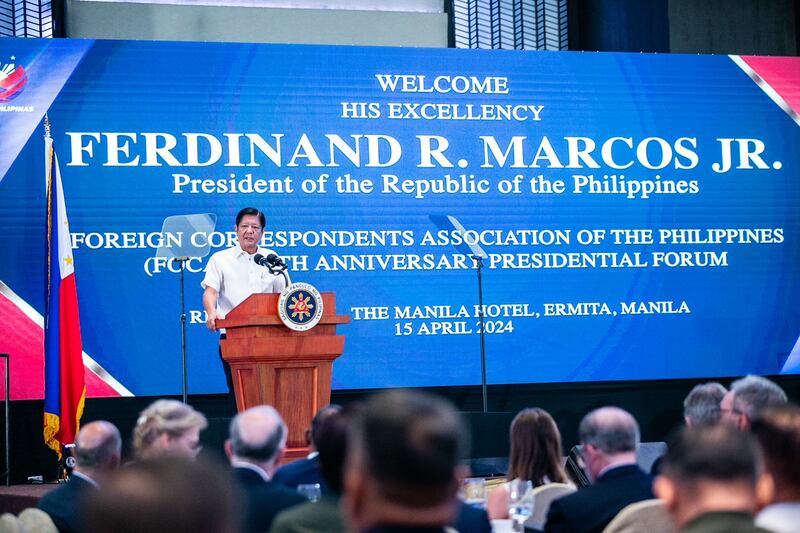UPDATED at 9:12 a.m. ET on 2024-04-15
Philippine President Ferdinand Marcos Jr. said Monday he was convinced that his predecessor, Rodrigo Duterte, had entered into a questionable “secret agreement” with Beijing on the South China Sea, while maintaining there was no record of its existence.
Duterte's former spokesman, Harry Roque, has said that the previous Philippine administration struck a deal with China to keep the "status quo" in the disputed waterway. It allegedly included a pledge by Manila not to repair the BRP Sierra Madre, a World War II-era ship that was run aground to serve as the Philippines' military outpost at Second Thomas Shoal.
“I think by now you can see that in fact there was a secret agreement and what verifies that and what at least convinces me was the insistence of the Chinese government,” Marcos said in a forum organized by the Foreign Correspondents Association of the Philippines (FOCAP) on Monday.
“I don’t think Beijing will make it up out of nowhere when there is no such thing. I think in my mind, that is sufficient to prove to me that there was such an agreement.”
Last week, Marcos said he had seen no documentation or record of the so-called gentlemen's agreement, adding he was "horrified" by the possibility that Philippines' sovereignty might have been compromised.
“Why is there not one single document that contains that agreement?” he said on Monday. “Why, when we took the transition period between the previous administration and this administration, did no one mention a secret agreement?”
In an interview on the sidelines of a historic trilateral summit with U.S. and Japanese leaders last week, Marcos told reporters that officials must be held accountable for the agreements they make.
“You have any agreement with another sovereign state should really be known by the people so that way you’re accountable. If it’s a bad decision, you’re accountable,” he said in Washington, according to transcripts released by the president's office.
Marcos said he had reached out to different Duterte administration officials to seek clarification on the issue, but had received conflicting answers.
Duterte last week criticized Marcos for taking a pro-America stance, calling his successor a “cry baby” after the latter had questioned his alleged deal with Beijing.
Days before Marcos appeared for the first time as president in front of members of FOCAP, Duterte denied that he and Chinese President Xi Jinping had ever made such a verbal agreement on the contested waterway.
Duterte said no one – not even the Philippine President – “can concede anything of our territories” to a foreign power.
“Let me be very clear on this: We have not conceded anything to China. There might have been [an] exchange of control over the China Sea to those who are really territorial in nature, not involving the encroachment of China in our exclusive economic zone. That’s different,” he said in an interview with SMNI, a broadcast network owned by a friend.
Duterte said he remembered speaking with Xi, and that they had agreed to maintain the status quo over the disputed sea to avoid an escalation of tensions.
“That’s what I remember. If it were a gentleman's agreement, it would always have been an agreement to keep the peace in the South China Sea,” Duterte told SMNI and reporters in his hometown of Davao.

Marcos’ latest criticism of the ex-president highlights a growing feud between the country’s top two political families, which allied in the last election. Duterte’s daughter, Sara, is the vice-president under Marcos.
Marcos told journalists on Monday that his relationship with Sara was “complicated.”
No additional bases for US
Meanwhile, Marcos said that the Philippines would not grant the U.S. military access to any more bases in the Southeast Asian archipelago, despite heightened tensions in the region.
In 2023, Marcos granted the U.S. access to an additional five bases, many of which are located near Taiwan and the South China Sea, bringing the total number available for American forces to nine.
“The Philippines has no plans to open or to establish more EDCA bases,” Marcos said, referring to the Enhanced Defense Cooperation Agreement signed between Washington and Manila in 2014 allowing the rotation.
Asked if he was concerned about a possible change of leadership in the White House after this year’s U.S. election, Marcos said changes in foreign policy were “inevitable” but he believed Manila’s agreements with Washington to be on “good ground.”
“If [Joe] Biden is reelected, we have a fairly solid ground to base on our position because we have already spoken. But I believe what we have agreed with the U.S. is beyond all that. They almost rise to duty agreements,” Marcos said.
Aside from the U.S., Marcos is stepping up ties with Japan, which is also a maritime nation facing similar challenges with China in the East China Sea.
Marcos said Manila and Tokyo would soon sign the Reciprocal Access Agreement, which would grant rotational access to both country’s military forces for training and joint exercises.
“It’s just a question of getting the language down and defining precisely how it's going to work, the logistical system and how it’s going to work,” he said.
Marcos said it would be different from the Visiting Forces Agreement with the U.S., but did not disclose further details.
